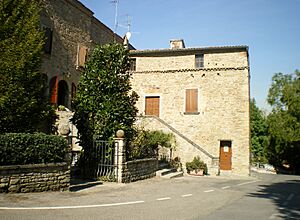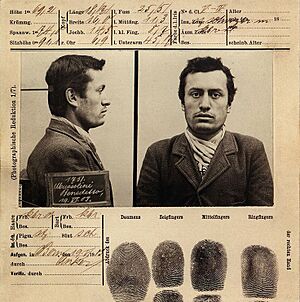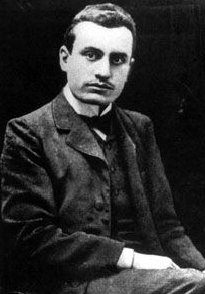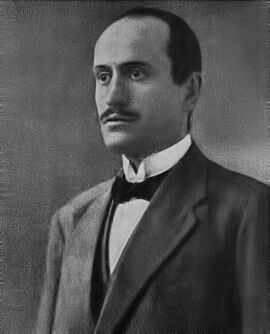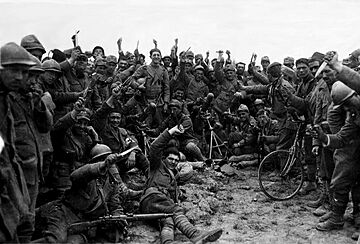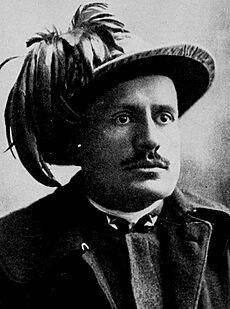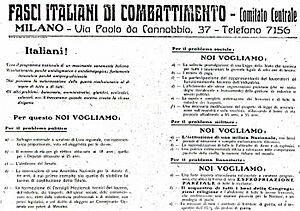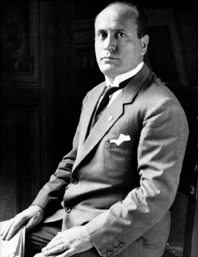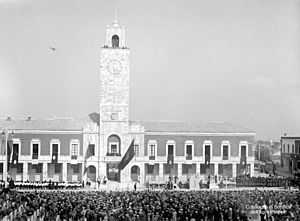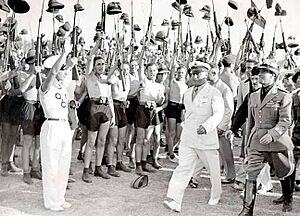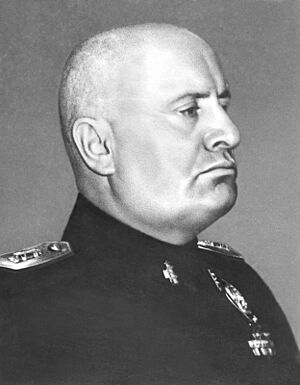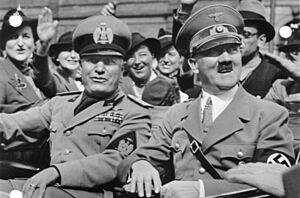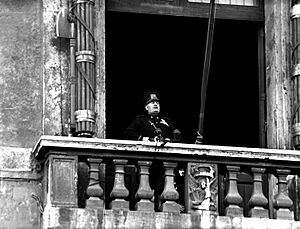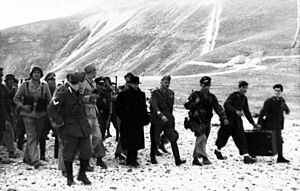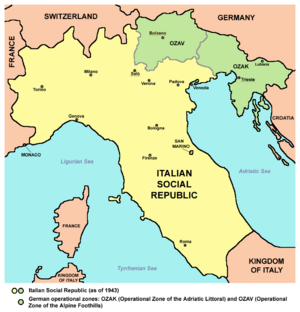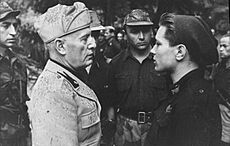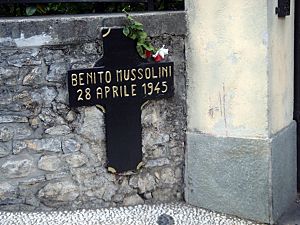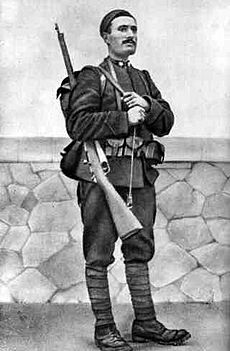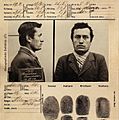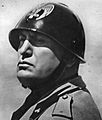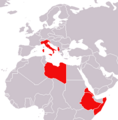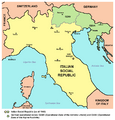Benito Mussolini facts for kids
Quick facts for kids
Benito Mussolini
KSMOM GCTE
|
|||||||||||||||||||||||||||||||||||||||||||||||||||||||||||||||||||||||||||||||||||||||||||||||||||||||||||||||
|---|---|---|---|---|---|---|---|---|---|---|---|---|---|---|---|---|---|---|---|---|---|---|---|---|---|---|---|---|---|---|---|---|---|---|---|---|---|---|---|---|---|---|---|---|---|---|---|---|---|---|---|---|---|---|---|---|---|---|---|---|---|---|---|---|---|---|---|---|---|---|---|---|---|---|---|---|---|---|---|---|---|---|---|---|---|---|---|---|---|---|---|---|---|---|---|---|---|---|---|---|---|---|---|---|---|---|---|---|---|---|---|
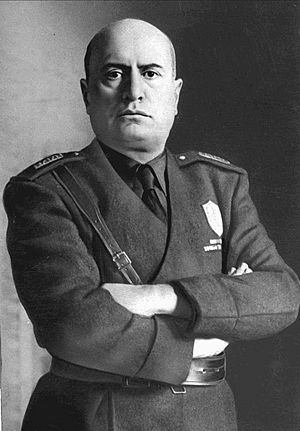
Mussolini in 1939
|
|||||||||||||||||||||||||||||||||||||||||||||||||||||||||||||||||||||||||||||||||||||||||||||||||||||||||||||||
| Prime Minister of Italy | |||||||||||||||||||||||||||||||||||||||||||||||||||||||||||||||||||||||||||||||||||||||||||||||||||||||||||||||
| In office 31 October 1922 – 25 July 1943 |
|||||||||||||||||||||||||||||||||||||||||||||||||||||||||||||||||||||||||||||||||||||||||||||||||||||||||||||||
| Monarch | Victor Emmanuel III | ||||||||||||||||||||||||||||||||||||||||||||||||||||||||||||||||||||||||||||||||||||||||||||||||||||||||||||||
| Preceded by | Luigi Facta | ||||||||||||||||||||||||||||||||||||||||||||||||||||||||||||||||||||||||||||||||||||||||||||||||||||||||||||||
| Succeeded by | Pietro Badoglio | ||||||||||||||||||||||||||||||||||||||||||||||||||||||||||||||||||||||||||||||||||||||||||||||||||||||||||||||
| Duce of the Italian Social Republic | |||||||||||||||||||||||||||||||||||||||||||||||||||||||||||||||||||||||||||||||||||||||||||||||||||||||||||||||
| In office 23 September 1943 – 25 April 1945 |
|||||||||||||||||||||||||||||||||||||||||||||||||||||||||||||||||||||||||||||||||||||||||||||||||||||||||||||||
| Preceded by | Office established | ||||||||||||||||||||||||||||||||||||||||||||||||||||||||||||||||||||||||||||||||||||||||||||||||||||||||||||||
| Succeeded by | Office abolished | ||||||||||||||||||||||||||||||||||||||||||||||||||||||||||||||||||||||||||||||||||||||||||||||||||||||||||||||
| Duce of Fascism | |||||||||||||||||||||||||||||||||||||||||||||||||||||||||||||||||||||||||||||||||||||||||||||||||||||||||||||||
| In office 23 March 1919 – 28 April 1945 |
|||||||||||||||||||||||||||||||||||||||||||||||||||||||||||||||||||||||||||||||||||||||||||||||||||||||||||||||
| Preceded by | Movement established | ||||||||||||||||||||||||||||||||||||||||||||||||||||||||||||||||||||||||||||||||||||||||||||||||||||||||||||||
| Succeeded by | Movement abolished | ||||||||||||||||||||||||||||||||||||||||||||||||||||||||||||||||||||||||||||||||||||||||||||||||||||||||||||||
|
|||||||||||||||||||||||||||||||||||||||||||||||||||||||||||||||||||||||||||||||||||||||||||||||||||||||||||||||
| Personal details | |||||||||||||||||||||||||||||||||||||||||||||||||||||||||||||||||||||||||||||||||||||||||||||||||||||||||||||||
| Born |
Benito Amilcare Andrea Mussolini
29 July 1883 Dovia di Predappio, Kingdom of Italy |
||||||||||||||||||||||||||||||||||||||||||||||||||||||||||||||||||||||||||||||||||||||||||||||||||||||||||||||
| Died | 28 April 1945 (aged 61) Giulino di Mezzegra, Kingdom of Italy |
||||||||||||||||||||||||||||||||||||||||||||||||||||||||||||||||||||||||||||||||||||||||||||||||||||||||||||||
| Cause of death | Summary execution by shooting | ||||||||||||||||||||||||||||||||||||||||||||||||||||||||||||||||||||||||||||||||||||||||||||||||||||||||||||||
| Resting place | San Cassiano cemetery, Predappio | ||||||||||||||||||||||||||||||||||||||||||||||||||||||||||||||||||||||||||||||||||||||||||||||||||||||||||||||
| Political party | PNF (1921–1943) | ||||||||||||||||||||||||||||||||||||||||||||||||||||||||||||||||||||||||||||||||||||||||||||||||||||||||||||||
| Other political affiliations |
|
||||||||||||||||||||||||||||||||||||||||||||||||||||||||||||||||||||||||||||||||||||||||||||||||||||||||||||||
| Spouses |
Ida Dalser
(m. 1914; div. 1915)Rachele Guidi
(m. 1915) |
||||||||||||||||||||||||||||||||||||||||||||||||||||||||||||||||||||||||||||||||||||||||||||||||||||||||||||||
| Domestic partners |
|
||||||||||||||||||||||||||||||||||||||||||||||||||||||||||||||||||||||||||||||||||||||||||||||||||||||||||||||
| Children |
|
||||||||||||||||||||||||||||||||||||||||||||||||||||||||||||||||||||||||||||||||||||||||||||||||||||||||||||||
| Parents |
|
||||||||||||||||||||||||||||||||||||||||||||||||||||||||||||||||||||||||||||||||||||||||||||||||||||||||||||||
| Relatives | Mussolini family | ||||||||||||||||||||||||||||||||||||||||||||||||||||||||||||||||||||||||||||||||||||||||||||||||||||||||||||||
| Signature | |||||||||||||||||||||||||||||||||||||||||||||||||||||||||||||||||||||||||||||||||||||||||||||||||||||||||||||||
| Military service | |||||||||||||||||||||||||||||||||||||||||||||||||||||||||||||||||||||||||||||||||||||||||||||||||||||||||||||||
| Allegiance | |||||||||||||||||||||||||||||||||||||||||||||||||||||||||||||||||||||||||||||||||||||||||||||||||||||||||||||||
| Branch/service | Royal Italian Army | ||||||||||||||||||||||||||||||||||||||||||||||||||||||||||||||||||||||||||||||||||||||||||||||||||||||||||||||
| Years of service | 1915–1917 (active) | ||||||||||||||||||||||||||||||||||||||||||||||||||||||||||||||||||||||||||||||||||||||||||||||||||||||||||||||
| Rank |
|
||||||||||||||||||||||||||||||||||||||||||||||||||||||||||||||||||||||||||||||||||||||||||||||||||||||||||||||
| Unit | 11th Bersaglieri Regiment | ||||||||||||||||||||||||||||||||||||||||||||||||||||||||||||||||||||||||||||||||||||||||||||||||||||||||||||||
| Battles/wars |
|
||||||||||||||||||||||||||||||||||||||||||||||||||||||||||||||||||||||||||||||||||||||||||||||||||||||||||||||
| a. | |||||||||||||||||||||||||||||||||||||||||||||||||||||||||||||||||||||||||||||||||||||||||||||||||||||||||||||||
Benito Amilcare Andrea Mussolini (born 29 July 1883, died 28 April 1945) was an Italian politician and journalist. He led Italy as Il Duce (meaning "The Leader") from 1922 until 1943.
Mussolini started the fascist movement in Italy in 1919. This movement later became the National Fascist Party. In 1922, after a big march on Rome, he became the Prime Minister of Italy. He then created a totalitarian dictatorship, meaning he had complete control over the country.
He led Italy into World War II as an ally of Nazi Germany. Near the end of the war in 1945, he was executed.
Before becoming a fascist leader, Mussolini was a socialist journalist. He was part of the Italian Socialist Party but was later removed. This happened because he wanted Italy to join World War I.
After leaving the socialist party, Mussolini focused on Italian nationalism. He founded the fascist movement. This movement believed in working together across different social groups. In October 1922, King Victor Emmanuel III made him prime minister.
Mussolini removed political opposition and gained complete control. He turned Italy into a one-party state. In 1929, he signed the Lateran Treaty. This agreement created Vatican City as an independent state.
Mussolini's foreign policy aimed to expand Italy's influence. He wanted Italy to have more territory in Europe and Africa. Italy expanded its control in Libya, leading to conflicts. In 1936, Italy conquered Ethiopia. In 1939, Italian forces also took over Albania.
Italy joined World War II in June 1940, siding with Germany. However, the war was very costly for Italy. In July 1943, King Victor Emmanuel III removed Mussolini from power. Mussolini was then rescued by German forces. Adolf Hitler made him the leader of a new state in northern Italy, called the Italian Social Republic. This state was controlled by Germany. Mussolini was captured and executed in April 1945.
Contents
Early Life and Education
Benito Mussolini was born on 29 July 1883. He grew up in Dovia di Predappio, a small town in Italy. His father, Alessandro Mussolini, was a blacksmith and a socialist. His mother, Rosa Maltoni, was a Catholic schoolteacher.
Mussolini's father named him Benito after a Mexican president. His middle names honored Italian socialists. His family was not wealthy, but they were not the poorest either. Benito's father was active in local politics.
As a child, Mussolini helped his father. His father's political ideas greatly influenced him. He admired Italian nationalist figures like Giuseppe Garibaldi.
Mussolini attended a boarding school. He was a shy but often difficult student. He sometimes clashed with teachers and other students. Later, he went to a non-religious school. He earned good grades and became an elementary school teacher in 1901.
Early Travels and Studies
In 1902, Mussolini moved to Switzerland. He wanted to avoid military service. He worked as a stonemason but struggled to find steady work.
During this time, he studied the ideas of important thinkers. These included Friedrich Nietzsche and Georges Sorel. Sorel's ideas about using strong actions to change society impressed Mussolini.
Mussolini became involved in the Italian socialist movement in Switzerland. He wrote for a socialist newspaper. He also organized meetings and gave speeches to workers. He faced arrests for his political activities.
In 1904, Mussolini returned to Italy. He joined the army and served for two years. After his military service, he went back to teaching.
Becoming a Political Journalist
In 1909, Mussolini moved to Trento, then part of Austria-Hungary. He worked for the local Socialist Party. He also edited their newspaper. He later returned to Italy and edited another weekly paper.
Mussolini saw himself as an intellectual. He read many books on philosophy and politics. He taught himself French and German. He even translated works by famous philosophers.
He published articles and stories. He also wrote a novel that was critical of the church. This novel was later removed from circulation.
Mussolini became a well-known socialist in Italy. In 1911, he was jailed for protesting Italy's war in Libya. After his release, he helped remove other socialists who supported the war.
In 1912, he became a leader in the Italian Socialist Party. He became the editor of the socialist newspaper Avanti!. Under his leadership, the newspaper's readership grew greatly. Mussolini was very familiar with Marxist ideas. He even called Karl Marx "the greatest of all theorists of socialism."
From Socialism to Fascism
Leaving the Socialist Party
When World War I began in 1914, many socialist parties supported their countries joining the war. In Italy, there was a strong feeling of Italian nationalism. Many people wanted Italy to join the war.
Mussolini first supported his party's decision to stay neutral. But he soon changed his mind. He believed the war offered a chance for Italy to gain new territories. He also thought it could help overthrow old monarchies in Europe.
Mussolini argued that the war could bring about big social changes. He believed it should be supported as a "revolutionary war." This view clashed with other socialists who opposed the war.
He began to criticize the Italian Socialist Party. He felt they failed to understand the national issues of the time. Because of his support for Italy joining the war, he was expelled from the party.
Starting the Fascist Movement
After leaving the Socialist Party, Mussolini changed his political views. He stopped supporting class conflict. Instead, he focused on revolutionary nationalism. This idea aimed to unite all social classes.
In 1914, he started a new newspaper called Il Popolo d'Italia. He also formed a new political group. This group was called the Fasci d'Azione Rivoluzionaria. Its members called themselves Fascisti, or Fascists.
Mussolini believed in a strong leader for society. He thought this leader should come from any social class. He still saw himself as a nationalist socialist. He admired figures like Giuseppe Garibaldi.
The Fascists were a small group at first. They often clashed with socialists. These early conflicts showed Mussolini's belief in using political force.
Mussolini in World War I
Mussolini volunteered to fight in World War I. He joined the Bersaglieri unit in 1915. He fought on the front lines for about nine months.
He was promoted for his bravery and leadership. In 1917, he was wounded by a mortar bomb explosion. He was discharged from the army and returned to editing his newspaper.
In December 1915, he married Rachele Guidi. They already had a daughter, Edda.
Rise to Power in Italy
Forming the National Fascist Party
After World War I, Mussolini returned to politics. In 1919, he re-formed his group as the Fasci Italiani di Combattimento. This group grew quickly.
Fascism's ideas came from many sources. Mussolini admired Plato's ideas about a state led by an elite. He believed the state was most important, not individuals.
Mussolini's foreign policy aimed for "spazio vitale" (living space). This meant expanding Italy's territory. He believed Italy needed more land for its economy to grow.
He also believed that stronger nations should lead "inferior" ones. He made strong statements about Slavic peoples in Yugoslavia. He said Italy should not be afraid to sacrifice many "barbaric Slavs" for Italians.
Mussolini wanted to create a "new Italian." This person would be heroic and loyal to the nation. They would put the state's interests above their own.
The Blackshirts and the March on Rome
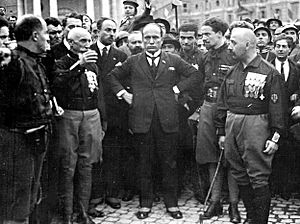
Mussolini's followers formed armed groups called blackshirts. These groups were made up of war veterans. Their goal was to bring order to Italy.
The blackshirts often fought with communists and socialists. The Italian government rarely stopped them. Many people feared a communist revolution.
The Fascist movement grew fast. In 1921, it became the National Fascist Party. Mussolini was elected to the Italian Parliament.
In October 1922, about 30,000 Fascist blackshirts marched on Rome. They demanded that the prime minister resign. They wanted a new Fascist government.
King Victor Emmanuel III refused to declare martial law. This led to the prime minister's resignation. The King then asked Mussolini to form a new government. This made Mussolini the Prime Minister of Italy.
Becoming Prime Minister
As Prime Minister, Mussolini first led a coalition government. It included Fascists, nationalists, and liberals. Fascists were a small part of his first government.
Mussolini's main goal was to create a totalitarian state. He wanted to be the supreme leader, or Il Duce. He quickly gained dictatorial powers.
He merged the Fascist groups into the armed forces. He also made the Fascist Party closely linked to the state. He passed laws that helped wealthy business owners.
In 1923, Mussolini sent Italian forces to invade Corfu. This was due to an incident with Greece. The League of Nations could not stop him. Greece had to meet Italy's demands.
In 1923, a law called the Acerbo Law was passed. It gave the party with the most votes a large majority in Parliament. This helped the Fascists win the 1924 elections.
Mussolini's Rule in Italy
Creating a Police State
Between 1925 and 1927, Mussolini took away many constitutional limits on his power. He built a police state. His title changed to "Head of the Government." He was only answerable to the King.
Local governments were abolished. Mayors were replaced by officials appointed by the state. Laws were passed to control public gatherings.
In 1926, all other political parties were outlawed. Italy became a one-party state. In 1928, parliamentary elections were replaced by a vote on a single list of candidates.
Mussolini also created a secret police force called the OVRA. This group helped him keep control. He appointed Cesare Mori to fight crime in Sicily. Mori used strong methods to achieve his goals.
Economic Changes
Mussolini started many public projects. These aimed to fight economic problems and unemployment. One famous project was the "Battle for Wheat." This created new farms and towns.
He also launched the "Battle for Land." This involved draining marshes for agriculture. These projects were good for propaganda. They also provided jobs.
However, these policies sometimes led to problems. Growing wheat on unsuitable land raised prices. High taxes were put on imported goods. This made the country go further into debt.
Mussolini increased government control over businesses. By 1935, he claimed that three-quarters of Italian businesses were state-controlled. He also tried to make Italy self-sufficient.
Propaganda and Public Image
Mussolini wanted to control the thoughts of the Italian people. He used a lot of propaganda. He created a cult of personality around himself. He was shown as a tireless and almost divine leader.
He personally held many government positions at once. He was also the head of the Fascist Party and the Blackshirts. This helped him keep all power in his own hands.
Teachers had to swear loyalty to the Fascist regime. Newspaper editors were chosen by Mussolini. Only those approved by the Fascist Party could be journalists.
The government spent a lot of money on public works. They also funded projects to boost Italy's image abroad. These included fast airplanes and transatlantic flights.
Culture and Religion
The Fascists wanted to shape Italian society. They focused on education for young people. The Opera Nazionale Balilla was created for children aged 8 to 18.
Mussolini believed in a "Fascist education." It aimed to create a complete and harmoniously developed person. This education emphasized collective action and loyalty to the leader.
Catholicism was also important to Fascist policy. In 1929, Mussolini signed the Lateran Treaty with the Vatican. This agreement made Vatican City an independent state. It also recognized Catholicism as Italy's state religion.
The Pope praised Mussolini for this agreement. Mussolini used this to gain support from Catholics. He also had his children baptized and married his wife in a religious ceremony.
Foreign Policy and Expansion
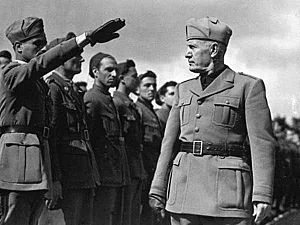
Mussolini wanted to create a new Roman Empire. He aimed to expand Italy's power in Africa and the Balkans. He believed Italy had a right to control the Mediterranean.
In the 1920s, he tried to avoid war with Britain and France. However, he did threaten war over the Corfu incident in 1923. He also secretly planned for future expansion.
Mussolini participated in international treaties. But he grew closer to Germany as tensions rose. He left the League of Nations in 1937. Italy then formed the Axis powers with Germany and Japan.
In 1935, Italy invaded Ethiopia. The League of Nations condemned Italy and imposed sanctions. However, these sanctions were not very effective. Italy used harsh tactics against Ethiopian forces.
Mussolini announced the creation of the Italian Empire in 1936. This made him very popular in Italy. The war, however, put a huge financial strain on Italy.
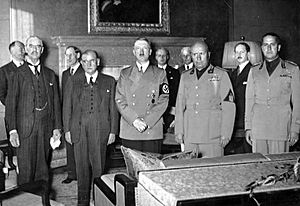
The sanctions pushed Mussolini closer to Germany. In 1936, Italy and Germany agreed to support Francisco Franco in the Spanish Civil War. This led to the creation of the Rome-Berlin Axis.
In 1938, Germany annexed Austria. Mussolini did not object this time. Italy also introduced Racial Laws in 1938. These laws discriminated against Jewish people and black subjects in the Empire. Many Italians did not like these laws.
Mussolini helped arrange the Munich Conference in 1938. This meeting aimed to prevent war between Germany and other European powers. He was seen as a "savior of peace" for this.
World War II and Fall
Joining the War
Mussolini was hesitant to fully align with Germany. Italy was not ready for a major war. He hoped to expand Italy's power in the Mediterranean.
In 1939, Mussolini ordered the occupation of Albania. This showed his strength to Germany. In May 1939, Italy signed the Pact of Steel with Germany. This created a strong military alliance.
Mussolini thought a big European war would not start until 1942. He was wrong. Germany invaded Poland in September 1939. This started World War II. Italy remained neutral at first.
Convinced that Germany would win quickly, Mussolini decided to join the war. Italy declared war on Britain and France on 10 June 1940. Mussolini saw this as a fight between fascism and democracies.
Italy joined Germany in the Battle of France. Italian forces also attacked British territories in Africa. They had some early successes. However, Britain refused to make peace.
Path to Defeat
In September 1940, Italian forces invaded Egypt. They advanced but then stopped to wait for supplies. Italy also sent air forces to help Germany in the the Blitz.
Mussolini met with Hitler to plan strategy. But Germany often acted without telling Italy. Mussolini decided to start a "parallel war" to show Italy's independence.
He ordered an attack on Greece in October 1940. This war was a disaster for Italy. The Italian troops were not well-equipped. The Greek army fought back strongly.
Italian forces were forced to retreat into Albania. At the same time, British forces defeated the Italian army in Egypt. Italian forces in East Africa were also defeated.
Mussolini met Hitler again in 1941. Germany promised to send aid to Italy. Italy's military performance improved with German help. But Italy became more dependent on Germany.
Italy also declared war on the Soviet Union and the United States. Italian troops suffered heavy losses on the Eastern Front. This made Mussolini less popular in Italy.
By 1942, Italy controlled much of the Mediterranean. Italian forces, with German help, pushed into Egypt. But they were stopped at El Alamein. In November 1942, Italy occupied Corsica and Tunisia.
Dismissal and Arrest
By 1943, Italy's military situation was very bad. Axis forces were defeated in North Africa. Italy also faced big losses on the Eastern Front and in Sicily.
Allied bombings were damaging Italian cities. Factories stopped working due to lack of materials. Food was scarce and expensive. Many Italians turned against Mussolini.
In March 1943, there were strikes in northern Italy. When the Allies invaded Sicily, many people welcomed them. Mussolini feared an Allied attack on Italy.
In July 1943, the Allies bombed Rome. This was the first time the city had been attacked. It was clear the war was lost for Italy.
Some important members of Mussolini's government turned against him. They held a meeting of the Grand Council. They voted to ask the King to take back his full powers. This was a vote of no confidence in Mussolini.
On 25 July 1943, King Victor Emmanuel III dismissed Mussolini from office. Mussolini was then arrested. People rejoiced, believing the war would end. The King appointed Marshal Pietro Badoglio as the new prime minister.
Mussolini was moved to different locations to hide him from the Germans. He was finally imprisoned at Campo Imperatore, a mountain resort. Badoglio pretended to be loyal to Germany. But he secretly negotiated with the Allies.
On 3 September 1943, Italy agreed to an armistice with the Allies. This was announced five days later. German troops then took control of Italy. The King and Badoglio fled south.
The Italian Social Republic
On 12 September 1943, German paratroopers rescued Mussolini. He was taken to Germany to meet Hitler. Hitler made Mussolini the leader of a new state. This was called the Italian Social Republic, or the Salò Republic.
This new state was in German-occupied northern Italy. It was much smaller than Italy had been. Many Italian territories were lost to the Allies or Germany.
Mussolini lived in Gargnano on Lake Garda. He was a puppet ruler under German control. He felt like he was under house arrest.
Under pressure from Hitler, Mussolini allowed the execution of some leaders who had betrayed him. One of them was his son-in-law, Galeazzo Ciano. Mussolini spent much of his time writing his memoirs.
Death of Mussolini
By 25 April 1945, Allied troops were advancing into northern Italy. The Salò Republic was about to collapse. Mussolini and his companion, Clara Petacci, tried to escape to Switzerland.
On 27 April, they were stopped by communist partisans near Dongo. They were identified and arrested. The Allies had asked for Mussolini to be handed over to them.
The next day, Mussolini and Petacci were executed by firing squad. Most of their group were also executed. The shootings happened in the village of Giulino di Mezzegra.
Personal Life
Mussolini had a wife named Rachele Guidi. They had five children: Edda, Vittorio, Bruno, Romano, and Anna Maria. His son Bruno died in an air accident in 1941.
Mussolini spoke Italian, English, and French. He also knew enough German to understand conversations. He was known for his ability to speak multiple languages.
Views on Religion and Race
Religious Views
Mussolini was raised by a Catholic mother and an anti-clerical father. As a young man, he said he was an atheist. He believed science showed there was no God. He thought religion was a weakness.
He admired Friedrich Nietzsche, a philosopher who was critical of Christian values. Mussolini valued Nietzsche's idea of a "superman." This idea was about a strong individual who defied traditional beliefs.
Despite his early views, Mussolini later tried to gain support from Catholics. In 1924, his children received communion. In 1925, he had a religious marriage ceremony with his wife.
In 1929, he signed the Lateran Treaty with the Catholic Church. This agreement made Vatican City an independent state. It also recognized Catholicism as Italy's state religion. The Pope praised Mussolini for this.
After this, Mussolini sometimes claimed the Church was under the State. He also made private comments critical of the Pope. However, he publicly tried to appear religious.
After his fall from power in 1943, Mussolini spoke more about God. His widow said he remained mostly non-religious until later in his life.
Views on Race
Mussolini's views on Jewish people and race changed over time. He often acted based on what was politically useful. He initially saw Italian Jews as Italians.
In the early 1920s, Mussolini stated that Italy had no "Jewish Question." He said Italy would never have antisemitism (prejudice against Jewish people). He also spoke positively about the Zionist movement.
However, Mussolini strongly believed that black people were inferior to white people. He saw high birthrates in Africa as a threat to the "white race." He believed black people were "uncivilized."
By 1938, Hitler's influence on Mussolini became clear. Italy introduced the Manifesto of Race. This document was similar to Nazi laws. It took away rights from Jewish people. It also forbade marriages between Italians and those considered "inferior."
Many historians believe Mussolini adopted these laws to strengthen ties with Germany. However, some argue that Mussolini and other Fascists had shown prejudice before 1938.
Even after these laws, Mussolini sometimes made contradictory statements about race. He reportedly told a scholar that he did not believe in "stupid antisemitic theory." He said his policies were for "political reasons."
Mussolini and the Italian Army sometimes opposed German efforts to deport Italian Jews. Italy's refusal to fully cooperate influenced other countries.
However, in the Italian Social Republic, Fascist groups spread terror among Jews. Informers betrayed their neighbors. Italian journalists wrote anti-Jewish articles.
Mussolini also tried to gain support from Muslims in his empire. In 1937, he was called the "Protector of Islam."
Despite his public statements, Fascist Italy implemented many racist laws in its colonies. These laws enforced strict racial segregation. They were especially harsh in Italian East Africa.
Legacy
Mussolini's Family
Mussolini and his wife, Rachele Mussolini, had five children. Their son Bruno died in an air accident in 1941.
Some of Mussolini's descendants are active in Italian politics today. His granddaughter, Alessandra Mussolini, has been a member of the European Parliament. His great-grandson, Caio Giulio Cesare Mussolini, is also involved in politics.
Neo-fascism in Italy
Mussolini's ideas influenced fascist movements around the world. After World War II, the National Fascist Party was outlawed in Italy.
However, new parties emerged that continued its legacy. The Italian Social Movement was the largest of these. It later became the National Alliance, which moved away from fascism.
Today, some former members of the National Alliance are in the Brothers of Italy party. This is a major right-wing party in Italy.
Writings
- Giovanni Hus, il Veridico (Jan Hus, True Prophet), Rome (1913).
- The Cardinal's Mistress (1928).
- An essay on "The Doctrine of Fascism" appeared in the 1932 Enciclopedia Italiana.
- La Mia Vita ("My Life"), Mussolini's autobiography.
- Vita di Arnaldo (Life of Arnaldo), Milano, Il Popolo d'Italia, 1932.
- Scritti e discorsi di Benito Mussolini (Writings and Discourses of Mussolini), 12 volumes, Milano, Hoepli, 1934–1940.
- Parlo con Bruno (Talks with Bruno), Milano, Il Popolo d'Italia, 1941.
- Storia di un anno. Il tempo del bastone e della carota (History of a Year), Milano, Mondadori, 1944.
Interesting Facts About Benito Mussolini
- He was the youngest Prime Minister in Italy's history.
- Mussolini slowly removed all forms of democratic government to make himself dictator of Italy. This made him Europe's first fascist dictator in the 20th Century.
- Mussolini spoke four languages: English, German, French, and Italian.
- Mussolini wanted Italy to become a new Roman Empire.
- His nickname was “Il Duce,” which is Italian for ”The Leader.”
- He was a bully in his childhood.
- His Italian army in World War II was not very strong.
- For a short time, he was a school teacher and a journalist.
- Mussolini was discharged from the army after a bomb exploded in his trench and injured him.
Images for kids
-
Mussolini's booking file following his arrest by the police on 19 June 1903, Bern, Switzerland
-
Mussolini and the Quadrumvirs during the March on Rome in 1922: from left to right: Michele Bianchi, Emilio De Bono, Italo Balbo, and Cesare Maria De Vecchi
-
Socialist leader Giacomo Matteotti was murdered a few days after he openly denounced fascist violence during the 1924 elections.
-
From 1925, Mussolini styled himself Il Duce (the leader)
-
Mussolini inspecting troops during the Italo-Ethiopian War
-
On 25 October 1936, an alliance was declared between Italy and Germany, which came to be known as the Rome-Berlin Axis.
-
Italian Empire in 1939
-
Marshal Pietro Badoglio succeeded Mussolini as Prime Minister.
-
Mussolini with Adolf Hitler in Berlin, 1937
See also
 In Spanish: Benito Mussolini para niños
In Spanish: Benito Mussolini para niños
- Fascist syndicalism
- List of covers of Time magazine (1920s)
- Mediterraneanism
- Order of the Golden Spur
- Pact of Pacification
- Villa Mussolini


